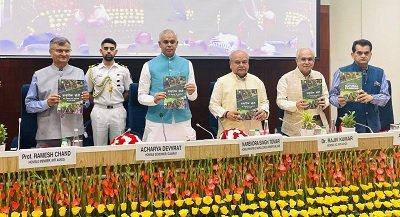Policymakers discuss ways to improve natural farming at NITI Aayog’s Innovative Agriculture workshop
A bilingual compendium of success stories of natural farming, consisting of 110 success stories from 13 states across India, was released during the event
NITI Aayog, as a part of Azadi ka Amrit Mahotsav celebrations, recently organised a national level workshop on ‘Innovative Agriculture’ in New Delhi.
Dr Neelam Patel, Senior Adviser, Agriculture and Allied Sectors (AAS) Vertical, NITI Aayog welcomed the participants and cited the need to understand the science, fundamentals, and processes behind the practice of natural farming. She hoped that the knowledge, research experience, and expertise of the international experts attending the workshop will aid in building the capacities of the Indian scientists, researchers, and policymakers for the promotion of natural farming in the country.
NITI Aayog CEO Amitabh Kant, during his address, said “Natural farming is the need of the hour and it is important to identify scientific ways so farmers can be assured direct benefits from natural farming and higher incomes.”
Addressing the workshop, Prof Ramesh Chand, Member, NITI Aayog said “We can give a chance to such alternatives because there is no serious threat to food security since we are food surplus.” He also called for stepwise adoption of natural farming.
Union Minister of Fisheries, Animal Husbandry and Dairying, Parushottam Rupala pointed out that the awareness about nutritious food, good health and immunity has increased during the pandemic. In this regard, he also highlighted the role of natural farming in providing nutritious food. He stressed the importance of cattle and livestock in ensuring better nutrition.
Addressing the workshop, Union Minister of Agriculture and Farmers Welfare, Narendra Singh Tomar mentioned that the Government has been encouraging agricultural practices that work in harmony with nature, reduce the cost of production, and ensure good-quality produce and profits for farmers. He also emphasised the importance of science and technology in natural farming.
Acharya Devvrat, Governor of Gujarat, shared his experience regarding how shifting to natural farming has led to a significant reduction in the cost of cultivation, improvement in soil health, and enhancement in yield. He also added that adopting natural farming will help optimise the work of farmers and benefit the environment at large, especially when it comes to the use of water. ‘There is huge scope for bringing in innovations in the agriculture sector through natural farming’, he added.
Dr Rajiv Kumar, Vice Chairman, NITI Aayog mentioned that the time is ripe to encourage natural farming and share the benefits with the people at large, especially our farmers. The shared experiences of states will help build a robust roadmap to adopt innovative agricultural practices in the country. He expressed his enthusiasm to come up with a successful road map toward natural farming in India post the workshop.
A bilingual compendium of success stories of natural farming, consisting of 110 success stories from 13 states across India, was released during the event.
The workshop had four technical sessions: (i) a panel discussion on natural farming in states, (ii) natural farming for soil health restoration and climate change mitigation, (iii) promotion of natural farming, (iv) innovations in natural farming.
During the first technical session, Yogi Adityanath, Chief Minister of Uttar Pradesh, joined the workshop virtually and highlighted the importance and traditional aspects of cow-based natural farming which helps sequester carbon and improve soil health. Shivraj Singh Chouhan, Chief Minister of Madhya Pradesh mentioned the state’s plan to promote natural farming on both the sides of the banks of the river Narmada and 5,200 villages. YS Jagan Mohan Reddy, Chief Minister, Andhra Pradesh stressed the need to enhance research on natural farming and stated the need for support from the Centre for natural agriculture in the ratio of 90:10. The Chief Minister of Uttarakhand, Pushkar Singh Dhami spoke about the current status, progress and challenges in natural farming in Uttarakhand.
In the second technical session, academicians, scientists, researchers, and dignitaries discussed the need to promote regenerative agriculture, strategies to reverse and mitigate climate change with traditional farming systems, the importance of sustainable agroecological food systems in the 21st Century, the role played by natural farming in making agriculture climate-resilient, and the need for green economics for a New India.
In the third technical session, the need to scale up natural farming, integration of National Rural Livelihood Mission (NRLM) resources, and the role played by Cooperatives and FPOs in the promotion and scaling up of marketing networks and provision of credit support for natural farming was highlighted. Dr Rajeshwar Chandel (Executive Director, Prakritik Kheti Khushhal Kisan Yojana, Himachal Pradesh) spoke about the Community based certification process in Natural Farming. Dr Baljit Saharan (Associate Prof. Haryana Agriculture University) said, “Improved soil biology and biodiversity play an important role in the promotion of natural farming.”
In the last technical session, innovations like pre-monsoon dry sowing, experiences in managing crop residue while practising natural farming, and mechanisation and automation for input preparations and applications in natural farming were shared.
More than 1250 participants from central ministries, state governments, industry, farmers, academic and research institutions, KVK’s and NGOs, delegates from national and international organizations in agriculture and allied sectors, and international delegates from France, Australia and Germany joined the workshop physically and virtually.
A bilingual compendium of success stories of



